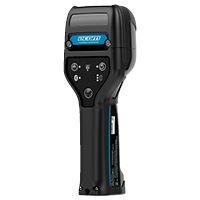RFID Handhelds—Convenient Hose Maintenance in Hazardous and Industrial Areas

RFID handhelds simplify hose maintenance
Among giant tanks and conveyor systems in chemical plants, thousands of hoses transport process media from point A to point B. Substances can include gas, oil, water, steam, and a range of chemicals. To ensure that these media are safely transported, legally defined regulations are in place for maintenance cycles of industrial and chemical hoses. RFID handhelds from Pepperl+Fuchs and ecom, paired with application-specific software developed by Neoception, make these maintenance tasks convenient and efficient.
Regular Checks Are Required by Law

Among giant tanks and conveyor systems in chemical plants, thousands of hoses transport process media from point A to point B.
Chemical plants are subject to comprehensive governmental supervision to ensure safe operation. Because these high safety standards also apply to the hoses in use, regular checks are required by law. Proper maintenance requires interruption of operation, complete plant shutdown, and removal of the hoses being checked. This makes it all the more important for plant operators to save additional time and costs by keeping tests to a minimum.
Intuitive Software Simplifies Documentation and Maintenance
In hazardous and industrial environments, documentation of the hose check can be easily done with an RFID handheld and application-specific software. To make this possible, RFID tags are attached to each hose. The following data is saved on the tags:
- Equipment number
- Inspection date and time
- Hose length and diameter
- Conductivity
- Test pressure
- Date of the next inspection
The hose information is read by the RFID handheld and then documented via the “hose manager” software from the Pepperl+Fuchs start-up Neoception. The auditor is guided through each test step by step, which ensures that no steps are forgotten. All results are recorded and then made available in a report file that can be uploaded to the ERP system wirelessly. For added convenience, the user interface is designed to be glove-friendly.
Localization Function and 2-D Imager for Additional Information
The RFID handhelds also feature a localization function that can be used to measure the distance to a detected tag on a bar graph. Besides detecting and localizing RFID tags, it is also possible to read out a variety of 1-D or 2-D codes. The integrated 2-D imager allows users to assign additional information to particular components using barcodes or QR codes. When reading the tags, this data can be linked to the other test results. This way, “Mobile Workers” can retrieve all information on site and save it in a log file or online.
Highlights of the RFID Handhelds for Hazardous and Industrial Areas
- RFID Handhelds available for hazardous and industrial areas
- Application-specific “hose manager” application simplifies maintenance
- Integrated 2-D imager for detection of 1-D and 2-D codes
- Localization function for faster and easier tag detection









 +61 3 9358 3400
+61 3 9358 3400